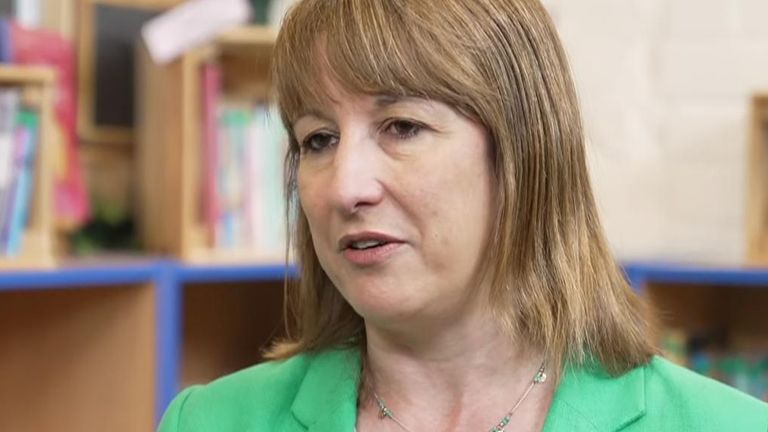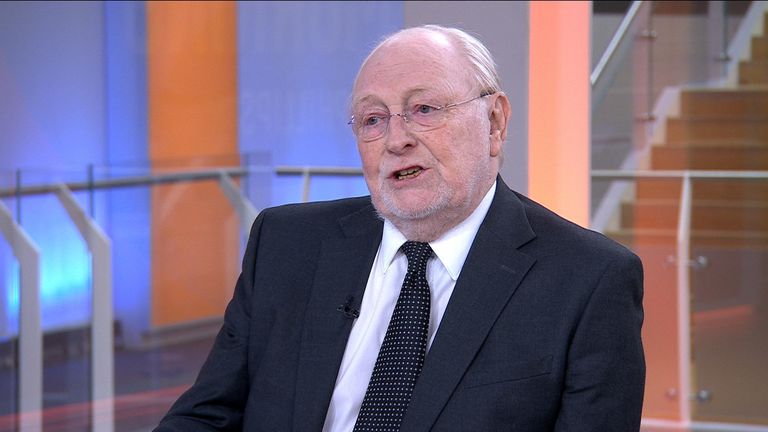The wealth tax options Reeves could take to ease her fiscal bind


Faced with a challenging set of numbers, the chancellor is having to make difficult choices with political consequences.
Tax rises and spending cuts are a hard sell.
Now, some in her party are calling for a different approach: target the wealthy.
Is there a way out of all of this for the chancellor?
Economic growth is disappointing and spending pressures are mounting. The government was already examining ways to raise revenue when, earlier this month, Labour backbenchers forced the government to abandon welfare cuts and reinstate winter fuel payments – blowing a £6bn hole in the budget.
The numbers are not adding up for Rachel Reeves, who is steadfastly committed to her fiscal rules. Short of more spending cuts, her only option is to raise taxes – taxes that are already at a generational high.
For some in her party – including Lord Kinnock, the former Labour leader, the solution is simple: introduce a new tax.
They say a flat wealth tax, targeting those with assets above £10m, could raise £12bn for the public purse.
Yet, the government is reportedly reluctant to pursue such a path. It is not convinced that wealth taxes will work. The evidence base is shaky and the debate over the efficacy of these types of taxes has divided the economics community.
Please use Chrome browser for a more accessible video player
1:16
Chancellor will not be drawn on wealth tax
Why are we talking about wealth?
Wealth taxes are in the headlines but calls for this type of reform have been growing for some time. Proponents of the change point to shifts in our economy that will be obvious to most people living in Britain: work does not pay in the way it used to.
At the same time wealth inequality has risen. The stock of wealth – that is the total value of everything owned – is much larger than our income, that is the total amount of money earned in a year. That disparity has been growing, especially during that era of low interest rates after 2008 that fuelled asset prices, while wages stagnated.
It means the average worker will have to work for more years to buy assets, say a house, for example.
Left-wing politicians and economists argue that instead of putting more pressure on workers – marginal income tax rates are as high as 70% for some workers – the government should instead target some of this accumulated wealth in order to balance the books.
Please use Chrome browser for a more accessible video player

2:19
Lord Kinnock calls for ‘wealth tax’
The Inheritocracy
At the heart of it all is a very straightforward argument about fairness. Few will argue that there aren’t problems with the way our economy is functioning: that it is unfair that young people are struggling to buy homes and raise families.
Proponents of a wealth tax say that it would not only raise revenue but create a fairer tax system.
They argue that the wealth distortions are creating a divided society, where people’s outcomes are determined by their inheritances.
The gap is large. A typical 50-year old born to the poorest 20% of parents in the UK is already worth just a quarter of what someone born to the richest 20% of parents is worth at that age. This is before they inherit anything when their parents die.
A lot of money is passed on earlier; for example, people may have had help buying their first home. That gap widens when the inheritance is passed on. This is when inheritance tax, one of the existing wealth taxes we have in the UK, kicks in.
However, its impact in addressing that imbalance is negligible. Most people don’t meet the threshold to pay it. The government could bring more people into the tax but it is already a deeply unpopular policy.
Please use Chrome browser for a more accessible video player

1:51
Former BP boss: Wealth tax would be ‘mistake’
Alternatives
So what other options could they explore?
Lord Kinnock recently suggested a new tax on the stock of wealth – one to two percent on assets over £10m. That could raise between £12bn and £24bn.
When making the case for the tax, Lord Kinnock told Sky News: “That kind of levy does two things. One is to secure resources, which is very important in revenues.
“But the second thing it does is to say to the country, ‘we are the government of equity’. This is a country which is very substantially fed up with the fact that whatever happens in the world, whatever happens in the UK, the same interests come out on top unscathed all the time while everybody else is paying more for getting services.”
However, there is a lot of scepticism about some of these numbers.
Wealthier people tend to be more mobile and adept at arranging their tax affairs. Determining the value of their assets can be a challenge.
In Downing Street, the fear is that they will simply leave, rendering the policy a failure. Policymakers are already fretting that a recent crackdown on non-doms will do the same.
Critics point to countries where wealth taxes have been tried and repealed. Proponents say we should learn from their mistakes and design something better.
Some say the government could start by improving existing taxes, such as capital gains tax – which people pay when they sell a second property or shares, for example.
The Labour government has already raised capital gains tax rates but bringing them in line with income tax could raise £12bn.
Then there is the potential for National Insurance contributions on investment income – such as rent from property or dividends. Estimates suggest that could bring in another £11bn.
This is nothing to sniff at for a chancellor who needs to find tens of billions of pounds in order to balance her books.
By the same token, she is operating on such fine margins that she can’t afford to get the calculation wrong. There is no easy way out of this fiscal bind for Rachel Reeves.
Whether wealth taxes are the solution or not, hers is a government that has promised reform and creative thinking. The tax system would be a good place to start.